|
| |
CONCERT
JAZZ
INTERNATIONAL ARTIST CONTACTS
Non-profit Jazz
Service Organisation formed in July 2005 to support Jazz and increase its
Presence
in the Community
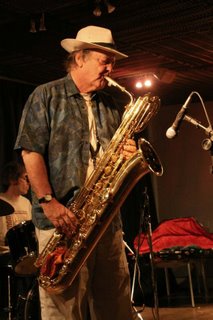 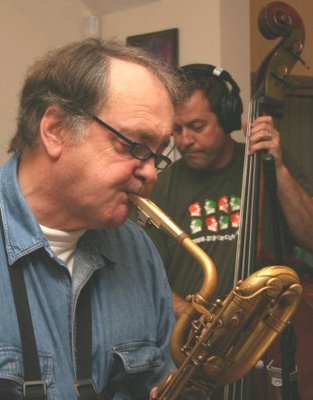 George
Haslam: George
Haslam:
Jazz Composer
Bandleader
Saxophonist &
Reedsman
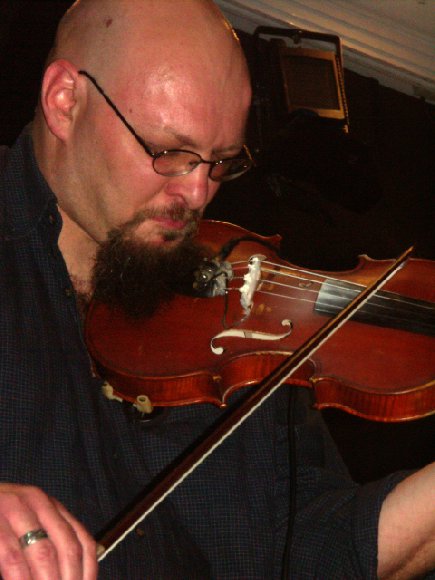 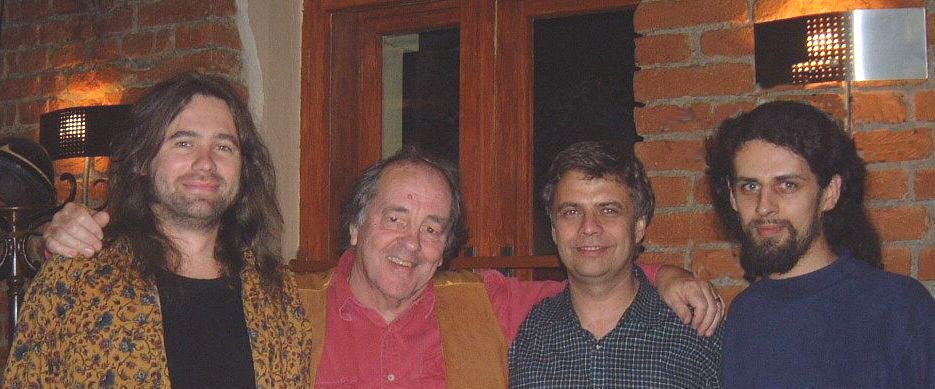
The FreeTime Quartet
- with Special Guest -
Stefano Pastor - Violin
George
Haslam - Baritone Sax and *Taragoto
Stefano
Pastor - Violin
Swetja - Electric,
Midi, Pedal Steel Guitar, Fujara Flute and Saw
Jozef Láska -
Acoustic and Electric Basses
Petr Zimák - drums
Freetime is an arts movement launched in Prague, 2002. Haslam's Quartet is one
element and there is a very active visual arts programme of exhibits across that
city.
The musical critics call
this "free form jazz". you can enjoy unique "FreeTime Compositions",
played by great musicians like George Haslam.
With George will be his three cohort Musicians
from Prague thus forming the FreeTime Quartet.
Free form is spontaneous composition on solo
instruments such as the saxophone and was explored by such as John Coltrane and
Sonny Rollins - both the instrumentalist and their art of extended improvisation
is a delight. It becomes an exhilarating exercise in concentration to follow the
artist's imagination as it whirls through the instrument, plumbing its depths,
bending its outer limits, flying through blinding glissandos and pulling out
quotes to standards, children's nursery rhymes and popular tunes like rabbits
out of hats.
Like Coltrane and Rollins - FreeTime plays its way through two worlds: the old
school of allegiance to melody and song structure, and the postmodern realm of
free-form invention. George Haslam weighs more heavily on the latter, as the
formal melodic discipline is deconstructed and re-worked by the improviser
in a process that is fascinating and inspiring to behold. A sound as capable of
communicating tenderness in addition to truculence.
"Now is the time to
blossom and be the music that transcends everything and includes everything.
Jazz is like nature. Every day a different sky, a different cloud, a different
rainbow: this is something that jazz represents. I'm trying to exemplify
everything in jazz. It's something that takes in the bigger picture." Sonny
Rollins
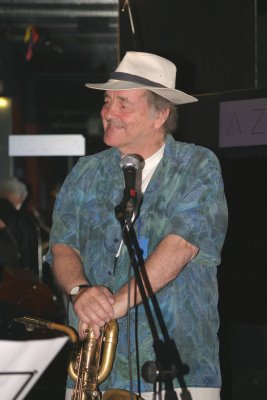 George
Haslam -
Born
Preston, Lancashire, 22 February 1939, baritone saxophone and tarogato. George
Haslam -
Born
Preston, Lancashire, 22 February 1939, baritone saxophone and tarogato.
George is largely self-taught - his tuition involved 'a few private
lessons and a lot of practice' - and throughout the 1950s and '60s he undertook
extensive work with dance bands and jazz groups before moving into free jazz and
improvisation in the 1970s. Early influences were Lester Young and Gerry
Mulligan.
In the early 1980s he worked extensively in eastern Europe, particularly in
Hungary, as a soloist and with his group The Siger Band: Paul Rutherford, Pete
McPhail, Tony Moore and Nigel Morris. In 1986 he played in Mexico as well as
leading the first British jazz group to play in Cuba and in 1990 was also the first
British jazz musician to play in Argentina. Since then he has returned regularly
to play in Cuba and Argentina and has begun to record
with Argentinean musicians.
Haslam has worked with a range of artists from Nat Gonella to Arturo Sandoval,
Derek Bailey to
Victor Sylvester, Mal Waldron, Steve Lacy, Charlie Mariano, Stan Tracey, Valery
Ponomarev, Joachim Kuhn. He has deliberately taken this eclectic approach to
music, partly to avoid being pigeon-holed, but largely because it reflects his very
diverse interests and love of different music. In 1989 he formed
SLAM Productions
originally to release his own music but now encompassing many other free jazz
and improvising musicians: Elton Dean,
Howard Riley,
Paul Rutherford,
Lol Coxhill, Paul
Dunmall, Steve Lacy, Mal Waldron, all reflecting Haslam's wide range of interests
and playing situations.
George Haslam's present work is in solo improvisation and also with Mal Waldron, Level
Two, as a member of the British Saxophone Quartet (with Lol Coxhill, Elton
Dean and Simon Picard) thus providing opportunities across a wide spectrum of jazz and
improvisation. He also continues to tour widely, particularly in South America,
East Europe (Hong Kong in January 1998) and more recently in Russia, Ukraine and
Finland. Also worked with Borah Bergman, Charlie Mariano, Bobby Carcasses,
Evan Parker, Paul Rutherford etc.
Voted 19th All Time World Greatest Baritone Saxophonist
in Japanese the Encyclopaedia of Jazz. Founded SLAM CD label 1989
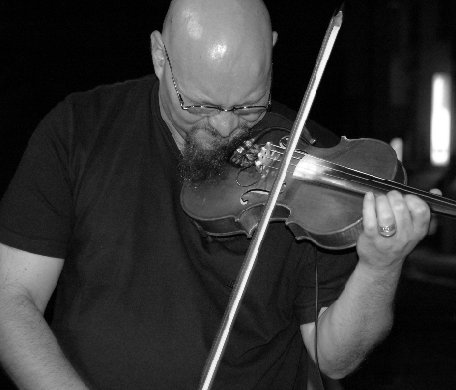 Stefano
Pastor from
Genoa - has graduated in violin with full marks in Jazz. He followed his
studies with Claudio Marzorati, Carlo Pozzi, Piero Farulli,
Lorenzo Lugli, Piero Leveratto and attends Master Classes with Enrico Rava and Dave
Liebman. In 1982 he won the contest "Laboratorio Lirico Sperimentale" and
for two years he performs with "Orchestra of Teatro di Alessandria". Since then
he played in many Orchestras such as the “Angelicum Symphony Orchestra” in
Milano sharing the stage with important Soloists and Directors such as Josè Carreras,
Cecilia Gasdia, Simone Alaimo, Paul Badura- Skoda, Lev Markiz, Edardo Muller,
Massimo Biscardi, Daniele Gatti, Pietro Borgonovo. He takes part in Studio
recordings with Massimo De Bernard, Mauro Ceccanti, the art-rock group
Picchio dal Pozzo and the popular singer-song- writer Paolo Conte. For the past
6 years he occupied first violin of the string quartet "Leon Battista Alberti",
recording often for Italian National television (RAI) and performing live
regularly. Stefano
Pastor from
Genoa - has graduated in violin with full marks in Jazz. He followed his
studies with Claudio Marzorati, Carlo Pozzi, Piero Farulli,
Lorenzo Lugli, Piero Leveratto and attends Master Classes with Enrico Rava and Dave
Liebman. In 1982 he won the contest "Laboratorio Lirico Sperimentale" and
for two years he performs with "Orchestra of Teatro di Alessandria". Since then
he played in many Orchestras such as the “Angelicum Symphony Orchestra” in
Milano sharing the stage with important Soloists and Directors such as Josè Carreras,
Cecilia Gasdia, Simone Alaimo, Paul Badura- Skoda, Lev Markiz, Edardo Muller,
Massimo Biscardi, Daniele Gatti, Pietro Borgonovo. He takes part in Studio
recordings with Massimo De Bernard, Mauro Ceccanti, the art-rock group
Picchio dal Pozzo and the popular singer-song- writer Paolo Conte. For the past
6 years he occupied first violin of the string quartet "Leon Battista Alberti",
recording often for Italian National television (RAI) and performing live
regularly.
At the present he devotes himself entirely to jazz music performing live with a
lot of important jazz musicians like Borah Bergman, Harry Beckett, George Haslam,
Paul Hession, Piero Leveratto, Maurizio Giammarco, Cristopher Culpo, Giancarlo
Schiaffini, Giorgio Dini, Giampaolo Casati, Claudio Capurro, Mauro Negri, Mario
Raja, Bruno Tommaso, Luciano Milanese, Nando De Luca e Alberto Tacchini.
In 2004 he issued a CD as leader of “Una Notte in Italia” for the Italian label
Videoradio obtaining the accolades of Italian and European critics. In the same
year was assistant to orchestra director Mario Raja at the Clinic of Siena
Jazz School. During 2005 he won 2nd prize at the prestigious “Rassegna Giovani Musicisti” in Cervo (Italy) and
was finalist in “International Arranging
and Composition Competition for Jazz Orchestra” with a study on Wayne Shorter
with
soloist Claudio Fasoli. In 2006 he issues a second CD named
Transmutations, by the English label SLAM Productions. The Review of musical
research called “Suono Sonda” publishes a work written by Stefano Pastor and the
poetess Erika Dagnino entitled “Cicli”. This work later became a four movement
suite and is then issued in May 2007 with the title “Cycles” by SLAM. The
CD's "Holywell
Session - Live in Oxford" and "Helios Suite" both issued
by SLAM in 2007 came out from a period of concert and recording dates in England
during 2006. The “Jazz Lighthouse” association, in collaboration with the
Genoa Commune, awarded to Pastor a special prize “for the research of new
expressive ways in jazz music”.
In 2007 releases “Uncrying
Sky” for Silta Records with Schiaffini, Dini and Rotella, a project based on
a music composition and poem by Pastor himself. He gives a series of Duo Concerts
documented by RAI - Radio tre, with the pianist Borah Bergmen from NYC and
they recorded a CD that will be issued in 2008.
He was placed seventh, as new best
talent, at the Italian critic's referendum "Top Jazz" in 2007.
He has also devoted himself to
teaching for many years.
FreeTime Quartet consisting of
George Haslam on baritone sax and tarogato, plus Czechs Jozef Láska on bass
guitar and string bass, drummer Petr Zimák and the single-named Swetja on midi guitar,
steel guitar and – most distinctively – singing saw and fujara, a flageolet
style, deep-bass Slovakian shepherd’s flute,
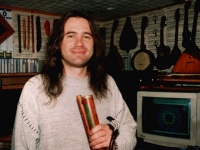 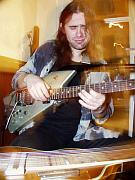 Swetja
-
the Guitarist
is a composer, arranger, multi-instrumentalist and multimedia
specialist. His civil name is Jaroslav Svitek, and he was born in Banska
Bystrica, Slovakia, in 1969. He is a graduate of the
Faculty of
Electrotechnics of the Technical University in Brno and has been working in
Prague since 1996. Swetja
-
the Guitarist
is a composer, arranger, multi-instrumentalist and multimedia
specialist. His civil name is Jaroslav Svitek, and he was born in Banska
Bystrica, Slovakia, in 1969. He is a graduate of the
Faculty of
Electrotechnics of the Technical University in Brno and has been working in
Prague since 1996.
Besides his studio work and active interaction with a number of Czech and Slovak
musicians, bands, orchestras, theatre groups and visual artists of diverse
backgrounds; Swetja plays regularly with the famous American blues player
King George, who was a close friend of Jimi Hendrix
Swetja's musical hallmark has been influenced by the genre of world music.
During his concerts, he switches between several instruments, which include the
Fujara, (overtone flute, specific to Slovakia) and the Saw. Nevertheless, his
music tends to be very modern. It is based on the fusion of acoustic instruments
and electronica, enhanced by original ideas of his own.
Swetjas own words -
What can I say about jazz? It's
another member of the big family of music styles, which I like to play. Also I
prefer complete freedom in music expression, that means maximum improvisation
from the musicians - you will hear some never repeatable "FreeTime
compositions", played by (in my opinion) great musicians like
George Haslam...
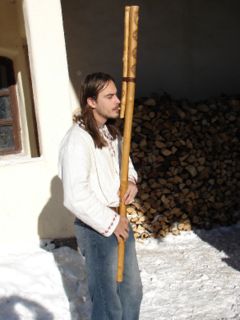 Fujara
is a Slovak traditional wood instrument (looking like a "big pipe"), with a
characteristic, unique sound. Fujara
is a Slovak traditional wood instrument (looking like a "big pipe"), with a
characteristic, unique sound.
The
Fujara is over five
feet (1.7m) long, deep-bass folk flute of Slovak shepherds used to call in their
Sheep.
Cherished in the seclusion of slovakian mountains, Fujara preserved over
centuries and as simple as it was from the beginning.
Fujara flute uniquely combines a natural, easy to learn playing technique and an
amazing voice!
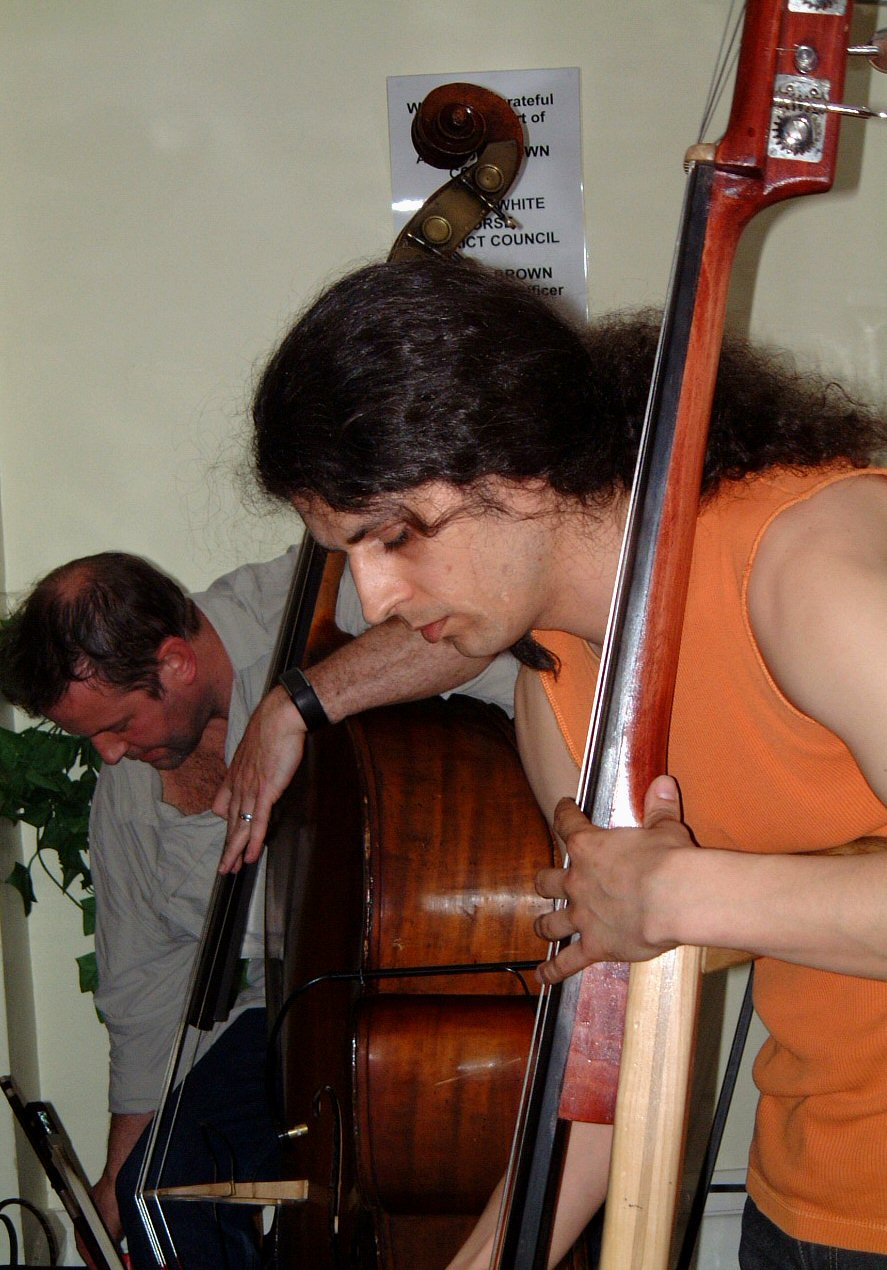
Jozef Laska - Bass Guitar and Double Bass originating from Zilina, Slovakia.
Often invited to perform with various Prague and Foreign Bands with
experimental and alternative directions in Music – in recent years played with
the King George Bluesology, FreeTime Quartet etc – lives in Prague where he has
become one of the most sought after Bassists for the jazz club scene.
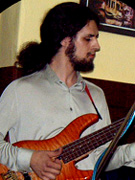
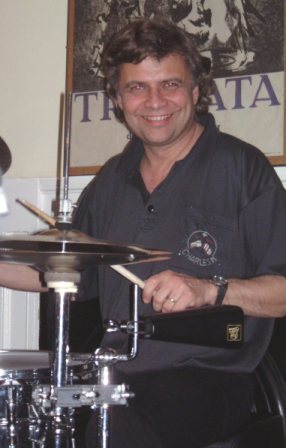 Petr Zimak from Prague on Drums
Petr Zimak from Prague on Drums
UK Tour
March 09
Promotional Information for
Jazz Festivals, Jazz Clubs, Music Clubs & Theatres
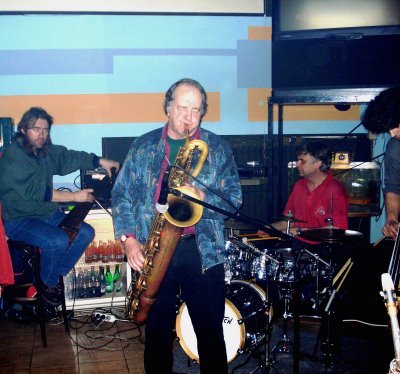 Czech
This Out! - Czech
This Out! -
The FreeTime Quartet - available in March/April 2009
George Haslam Baritone Sax and *Taragoto
Swetja - Electric, Midi, Pedal Steel Guitars, Fujara and Saw
Josef Láska - Acoustic and Electric Basses
Petr Zimák - drums
Next March/April George will arrange a visit to the UK by
jazz musician collaborators from Prague and Genoa - primarily to play at Abingdon Arts and
other Jazz or Music Festivals and is now looking for other Venue opportunities to give
these excellent Musicians a wider platform to display their prodigious talents.
The music is free swinging jazz played over strong
rhythmic grooves and got airplay on BBC Radio 3 'Jazz on 3' and 'Night Waves'.
The FreeTime Quartet will also be joined by a great electric violinist from
Genoa - Stefano Pastor.
FreeTime 2002*2003*2004
George Haslam Blogspot
 Taragato-
The tárogató is a single-reed, conical-bore woodwind, created in Hungary around
the turn of the century shortly after the invention of the saxophone. The
tárogató is sometimes called the national instrument of Hungary (on the other
hand, so is the cimbalom). The mouthpiece and reed are roughly similar to those
on a clarinet, but although newer tárogató mouthpieces take a clarinet reed, the
actual mouthpieces are not interchangeable. The fingering is also roughly
similar to an Albert-system clarinet, but because of the conical
bore, the tárogató breaks into the upper register an
octave higher like a saxophone, rather than the musical twelfth of the clarinet.
Thus the thumb hole and two upper keys used to bridge the lower part of the
upper register are omitted. The tárogató also has an extra key down on the bell,
operated by the right thumb. Taragato-
The tárogató is a single-reed, conical-bore woodwind, created in Hungary around
the turn of the century shortly after the invention of the saxophone. The
tárogató is sometimes called the national instrument of Hungary (on the other
hand, so is the cimbalom). The mouthpiece and reed are roughly similar to those
on a clarinet, but although newer tárogató mouthpieces take a clarinet reed, the
actual mouthpieces are not interchangeable. The fingering is also roughly
similar to an Albert-system clarinet, but because of the conical
bore, the tárogató breaks into the upper register an
octave higher like a saxophone, rather than the musical twelfth of the clarinet.
Thus the thumb hole and two upper keys used to bridge the lower part of the
upper register are omitted. The tárogató also has an extra key down on the bell,
operated by the right thumb.
George Haslam Playing
the Taragato
Promoters
If you are interested as a promoter
we will gladly send you promo materials and a CD.
Contact
For Booking
Enquiries for the FreeTime
Quartet for Jazz
Festivals, Theatre or Club Events, Corporate Events and Jazz Workshops
E-mail or Phone 01844 353117
Freetime Quartet will be touring the UK during these
dates in 2009:
March -
Jazz Cafe POSK Hammersmith - Sat 28th March 09 at 8.30pm
http://www.jazzcafeposk.co.uk/index-en.html
Abingdon Arts Festival ~ 2-14 March 09
Sunday 29
March at Royal British Legion - Abingdon
Friday 3 April at The Stocks Bar - Abingdon.
http://www.abingdonartsfestival.org.uk/
Tuesday 31 March The Bullingdon in Oxford.
Also
Saturday 4 April There is a dance in The Guildhall, Abingdon, and George Haslam swing band
(SWINGTIME) will play and Stefano is special guest. £10
The gigs are presented as:
FREETIME with STEFANO PASTOR
International Jazz with FreeTime Quartet from Prague - Swetja (guitar synth,
fujara, saw), Jozef Laska (bass), Petr Zimak (drums) George Haslam (baritone
sax, tarogato) and special guest violinist Stefano Pastor from Genoa.
BBC Radio recording session is scheduled
for the FreeTime Quartet + 1. This is to be broadcast on Monday 20 April 09 at
11.15pm Jazz on Radio 3.
Technical
Requirements for Performance Venues -
Full Drum Kit
Electric Bass Amplifier
PA
for the Quartet with 3 Quality Mics and Sound Engineer Supervision.
Recordings
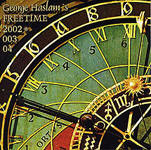 George
Haslam formed his FreeTime Quartet in 2002 with the assistance of a
Czech National Radio and a noted jazz club owner. He has now toured regularly
across the Czech Republic and occasionally beyond. Milos Latislav, the Radio
man, named the band to reflect its open and freely based improvisation over
positive rhythms and this recording is a document of the band - Haslam on
baritone sax and tarogato, Swetja on guitars, Fujara (a European overtone
flute) and Petr Zimak on drums - playing live with guest stars from a number
of countries. George
Haslam formed his FreeTime Quartet in 2002 with the assistance of a
Czech National Radio and a noted jazz club owner. He has now toured regularly
across the Czech Republic and occasionally beyond. Milos Latislav, the Radio
man, named the band to reflect its open and freely based improvisation over
positive rhythms and this recording is a document of the band - Haslam on
baritone sax and tarogato, Swetja on guitars, Fujara (a European overtone
flute) and Petr Zimak on drums - playing live with guest stars from a number
of countries.
Alternative Prelude is the album's opener and sets the tone for what is to
come. Over a sort of drone, Haslam floats spaciously and soulfully on
tarogato, a Hungarian single-reed instrument. Haslam suggests the freedom of
the avant garde jazzers but often moves into the realm of folk-based music
including the blues. Many of the tunes are short, simply displaying a
flash of a mood, but the spirit of this truly open- hearted musician shines
through.
Tracks
Alternative Prelude; Hupky Dupky; First Bass; Muffs; Wails from the Crypt;
Sagem Blues; Marks Mode; Second Bass; Trust Nature; Relaxing in Pardubice;
Sweets; Farewell Prague.
Personnel: George Haslam: baritone sax,
tarogato; Swetja: guitars, fujara, saw; Jozef Laska: contrabass; Petr Zimak:
drums.
Guests Include Steve Waterman - Trumpet, Mark Aanderud - Piano
“Relaxing in Pardubice”, with drummer Zimák holding down
the beat, as Láska’s ringing bass guitar accents back up Swetja’s coarse
fujara vibrations. With Zimák’s shuffle preventing the tune from a becoming
a Slovak folk dance, the fujara tones mix it up with vibrated taragoto
output, finally harmonizing in triple counterpoint as Haslam blows both his
horns in tandem.
Swetja’s third implement is given its showcase on the
descriptive “Wails from the Crypt”, with percussionist Jaroslav Kořán
substituting for Zimák. Manipulating his singing-saw like other workshop
implement masters such as Roy Brooks and Paul Lovens, Swetja adds its
ghostly chafing textures to Láska’s sul ponticello bass tones. An aural
picture of Transylvanian vampires flying in and out of a haunted castle’s
windows is the end result. Meanwhile, the saxman adds curvaceous smears to
the quivering wingspan sounds.
The other outstanding track, “Mark’s Mode”, features
Haslam and its namesake, Mexican pianist Mark Aanderud. Here, the reedman’s
harsh tongue stops and breath control are matched with high-frequency
cadences and chiming chords from the keyboardist. Offering a cascade of
irregularly voiced, but cohesive patterns, Aanderud assembles Latinesque
tremolos with the same intensity that Haslam creates new forms from warm
mouthfuls of slurred vibrato.
On the other hand, “Sagem Blues”, a quartet piece that
replaces Swetja’s strings with Aanderud’s piano doesn’t fare as well.
Bluesier – perhaps as a lampoon – rather than a conventional blues, it floats on
the bassist’s steady pulse, with the pianist’s mainstream comping and the
baritone saxophonist’s legato output making it sound like a straight-ahead
cop from Gerry Mulligan’s final decade, when the American saxophonist
finally came to terms with the piano.
The Album showcases some little heard Eastern European soloists. It
also confirms that seniority status has enhanced rather than limited
George Haslam’s creative power and his restless search for new playing partners.
Visit
George Haslam on the
web.
The George Haslam Record Label - Purchase on Line
SLAM is a small independent CD label founded by
GEORGE HASLAM in 1989. George explains how it came into being:
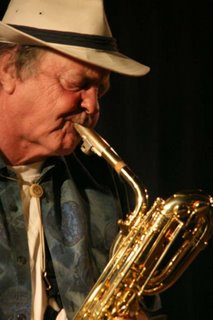 'In
1989 I decided to record some solo improvisations on baritone sax - I had
previously made a couple of LPs on Tony Williams’ “Spotlite” label but the
improvised music would be outside the recognized field of Spotlite. With
advice from 1 or 2 small label owners - notably Eddie Prevost (Matchless)
- I decided to do it myself. In the event I made the CD with Paul
Rutherford, solo tracks by each of us and duo tracks. The CD was called
“1989 - And All That” and I used the name SLAM. The following year I played
a wonderful concert in the Holywell Music Room, Oxford, with Paul, Lol
Coxhill and Howard Riley. It was recorded and released as a second CD. A
little later Howard came to me with a great recording by the quartet he was
co-leading with Elton Dean and he asked if I may be interested in releasing
it on “my label” - that was the first time I thought of it as a label. 'In
1989 I decided to record some solo improvisations on baritone sax - I had
previously made a couple of LPs on Tony Williams’ “Spotlite” label but the
improvised music would be outside the recognized field of Spotlite. With
advice from 1 or 2 small label owners - notably Eddie Prevost (Matchless)
- I decided to do it myself. In the event I made the CD with Paul
Rutherford, solo tracks by each of us and duo tracks. The CD was called
“1989 - And All That” and I used the name SLAM. The following year I played
a wonderful concert in the Holywell Music Room, Oxford, with Paul, Lol
Coxhill and Howard Riley. It was recorded and released as a second CD. A
little later Howard came to me with a great recording by the quartet he was
co-leading with Elton Dean and he asked if I may be interested in releasing
it on “my label” - that was the first time I thought of it as a label.
During the next decade the catalogue took shape,
centering on the British free jazz scene of the 1990s, including
lesser-known practitioners from various parts of the country and a good
percentage of women artists. Obviously there is a large section occupying
my own recordings - that was the original purpose of the label; I have
tried to include recordings made in different countries I have visited, with
musicians from those countries. The final section is recordings by foreign
artists, including some major names - Max Roach, Mal Waldron, Steve Lacy -
whom I have had opportunities to know - and play with.
For any
successful germination the right conditions must come together - artists,
venues, support and recording experts. In Oxford were two of the greatest,
Michael Gerzon and Tim Turan. Sadly Michael is no longer with us but Tim is
still our main man.
The record
scene has changed during recent years - recording and duplicating CDs is
easy, most musicians are making some to sell on gigs. The difficulty is
beyond that level - distribution and sales. Major labels are geared up for
that - they deal only with music they think will sell in large quantities.
SLAM comes
in the area between these extremes. Once a project is agreed, musicians have
full control of the production of the recording and artwork - as in a
‘self-release’ - SLAM manages production, pressing, promotion, sales and
distribution. In many cases most sales may still be on gigs but the CD has
the benefit of reviews, possible airplay and distribution at home and
abroad - and, of course, the strength of the mighty SLAM publicity
machine.
Reviews:-
One of the few really free spirits of British jazz,
Baritone Saxophonist George Haslam.
JAZZ Review, UK August
2005
Five tracks of
top-flight improvisation confirm that British baritone saxophonist George Haslam
is one of the mainstays of his instrument; Ken Waxman,
Jazz Week, Canada
“On baritone Haslam is a great
awesome force. Why has George Haslam never gotten his due? He's one of the
outstanding improvisors of our age."
“George Haslam
fascinates because he nudges the limits, explores unchartered territories, plays
creatively and conveys delight in doing so.
“Haslam possesses an attack and timbre that
speaks directly to the blues roots of his music”
“He has a gruff
smoothness and boppish dexterity on baritone sax that is as virtuosic as
Gerry Mulligan”
“Haslam’s mellow harmonic
patterns”
“Haslam, the root of this whole celebration, shows off his fat, unusual tone and
his gift for the simplicity of folk like improvisation”
Cadence,USA
“Pretty much anything that George Haslam plays on is guaranteed to be worth
listening to and this is no exception.”
Jazz Views UK
“George
Haslam is one of the most interesting bari sax players to go beyond traditional
styling's and explore the low range of the free.” Beyond
Coltrane
“Haslam proves himself to be an excellent
baritone player”
Rockerilla, Italy
“Haslam’s beautifully tender playing sometimes
recalls late-period Lester Young” “Scholarly and assiduous kind of post free
playing” “In the duet
with Haslam,"
furious free-jazz playing
from
(Howard) Riley meets
with sympathetic
and white hot response, managed without the reedsman sacrificing the warmth and
richness of his tone”
Wire, UK
“The sensitivity and attack of Haslam”
Jazz Passion, Switzerland
“One of the finest musicians currently
developing the art of improvisation ........authoritative and
highly sensitive” Wire, UK
“One of the lesser known but more important
voices on the saxophone” Jazz till
Twelve, Ukraine
“The charming
and playful humour
between Haslam’s
fruity baritone
and versatile vocalist Liz Hodgson”
Jazz Magazine, UK
“George Haslam is that rarity, a bona fide
baritone specialist” Ostinato, UK
“The
last time I encountered so
conversational a form of
improvisation was in a rematch of the Giuffre-Bley-Swallow trio”
Jazz on CD, UK
“George Haslam, a much underrated baritone
saxophonist, was excellent” Derek Ansell, UK
“Thick toned baritone”
Jazz Notes, Australia
“Haslam
has carved his reputation from his
musical handling of the rich throaty
baritone saxophone” The Standard, Hong Kong
“George
Haslam, gritty baritone saxist, provides some gorgeous gut-bucket r & b”
Yorkshire Evening Post, UK
“Skill
liberates him but he
stays in control and his solos were worth being repeated
immediately so that the listener could capture his whole thought”
Clarin, Argentina
“The
euphoric drive of George Haslam” Jazzman, France
“Gruff
friendly baritone” London Musicians’ Collective, UK
“The complete saxophonist”
Bobby Carcassés, Cuba
“George Haslam playing barrel
chested but remarkably fluent baritone saxophone” The Guardian, UK
“Brilliant work in
improvisation in the world of free jazz” South China
Morning Star
“The real challenge for a
jazz musician playing unaccompanied solo concert was for Haslam
a smooth path of harmonious
and rhythmic richness which
can only be found in those
who have made the journey between what is academic and what
is new” La
Capital, Argentina
Jazz Workshops:
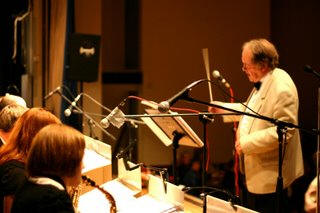 George
is also keen to impart his skills to
Students of Jazz and can hold Workshop/Master Class
projects in Colleges, Theatres, Studios and other suitable venues. These can
be linked up with
daytime assemblies at any of the evening Concert Venues.
Details:
The George Haslam Jazz Workshop provides
a platform for seasoned professionals and total beginners
alike can learn, grow and flourish together in a uniquely inspiring and
supportive environment.
One day workshop lasting 3 hours, would consist of:-
·
up and medium tempo grooves
·
contemporary jazz styles
. Improvisation
Education and working with
young musicians is a very important area of George Haslam's work and he
gives individual tuition on saxophone both in schools and privately, coaches
youth big bands and organises workshops on Learning the Blues which
he has presented over the years from South America to Hong Kong. Jazz is a
Universal Language and has no Boundaries or Borders.
Classes can
be structured to specific needs and encompass all music genres.
Workshops
Workshops function well in conjunction with a show. Talk to us about
the possibilities. The Artists knows best what they can do and what works,
it knows who the potential participants are. Workshops will give local
people a chance to have a go. They will educate, encourage participation,
raise awareness and be fun. They require good planning, preparation
and evaluation. If the workshop is combined with an event, it will
encourage new people to come to the performance (offer a joint ticket with
entry to the main performance). You are assured of a good audience,
timid people may well feel encouraged to come to another post concert
workshop the next day.
It's a brilliant idea and
reaches so many people - with excellent professional teacher-performers and
a great chance to meet them in person.
Attach
a short talk to the main event. Get the audience to come a little early to
talk to the Musical Director or stay behind to meet the Band.
Jazz @ The Speed of
Light over 4000 Miles
Czech Centre
London
13 Harley Street
London
W1G 9QG
tel: +44-20-7307 5180
fax: +44-20-7323 3709
http://www.czechcenters.cz/london/stranka.asp?ID=1251&menu=4655
|
 George
Haslam formed his FreeTime Quartet in 2002 with the assistance of a
Czech National Radio and a noted jazz club owner. He has now toured regularly
across the Czech Republic and occasionally beyond. Milos Latislav, the Radio
man, named the band to reflect its open and freely based improvisation over
positive rhythms and this recording is a document of the band - Haslam on
baritone sax and tarogato, Swetja on guitars, Fujara (a European overtone
flute) and Petr Zimak on drums - playing live with guest stars from a number
of countries.
George
Haslam formed his FreeTime Quartet in 2002 with the assistance of a
Czech National Radio and a noted jazz club owner. He has now toured regularly
across the Czech Republic and occasionally beyond. Milos Latislav, the Radio
man, named the band to reflect its open and freely based improvisation over
positive rhythms and this recording is a document of the band - Haslam on
baritone sax and tarogato, Swetja on guitars, Fujara (a European overtone
flute) and Petr Zimak on drums - playing live with guest stars from a number
of countries.



 Fujara
is a Slovak traditional wood instrument (looking like a "big pipe"), with a
characteristic, unique sound.
Fujara
is a Slovak traditional wood instrument (looking like a "big pipe"), with a
characteristic, unique sound.


 Petr Zimak from Prague on Drums
Petr Zimak from Prague on Drums Taragato-
The tárogató is a single-reed, conical-bore woodwind, created in Hungary around
the turn of the century shortly after the invention of the saxophone. The
tárogató is sometimes called the national instrument of Hungary (on the other
hand, so is the cimbalom). The mouthpiece and reed are roughly similar to those
on a clarinet, but although newer tárogató mouthpieces take a clarinet reed, the
actual mouthpieces are not interchangeable. The fingering is also roughly
similar to an Albert-system clarinet, but because of the conical
bore, the tárogató breaks into the upper register an
octave higher like a saxophone, rather than the musical twelfth of the clarinet.
Thus the thumb hole and two upper keys used to bridge the lower part of the
upper register are omitted. The tárogató also has an extra key down on the bell,
operated by the right thumb.
Taragato-
The tárogató is a single-reed, conical-bore woodwind, created in Hungary around
the turn of the century shortly after the invention of the saxophone. The
tárogató is sometimes called the national instrument of Hungary (on the other
hand, so is the cimbalom). The mouthpiece and reed are roughly similar to those
on a clarinet, but although newer tárogató mouthpieces take a clarinet reed, the
actual mouthpieces are not interchangeable. The fingering is also roughly
similar to an Albert-system clarinet, but because of the conical
bore, the tárogató breaks into the upper register an
octave higher like a saxophone, rather than the musical twelfth of the clarinet.
Thus the thumb hole and two upper keys used to bridge the lower part of the
upper register are omitted. The tárogató also has an extra key down on the bell,
operated by the right thumb.